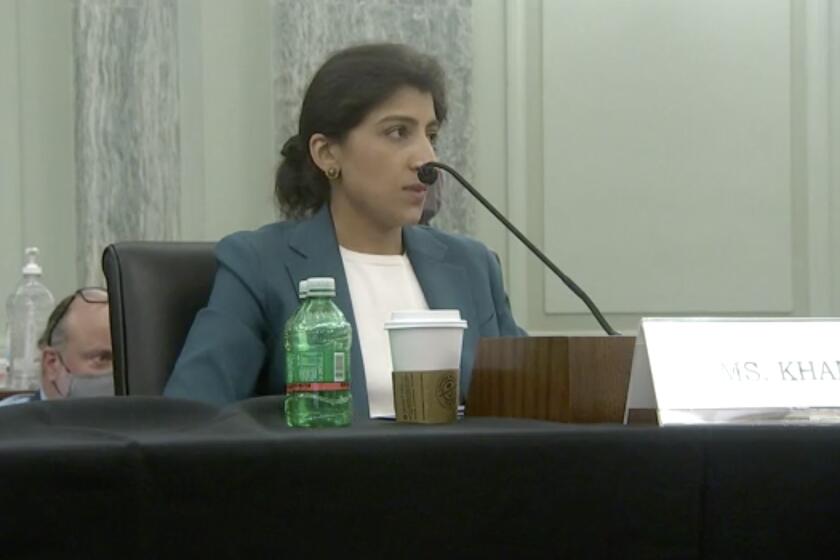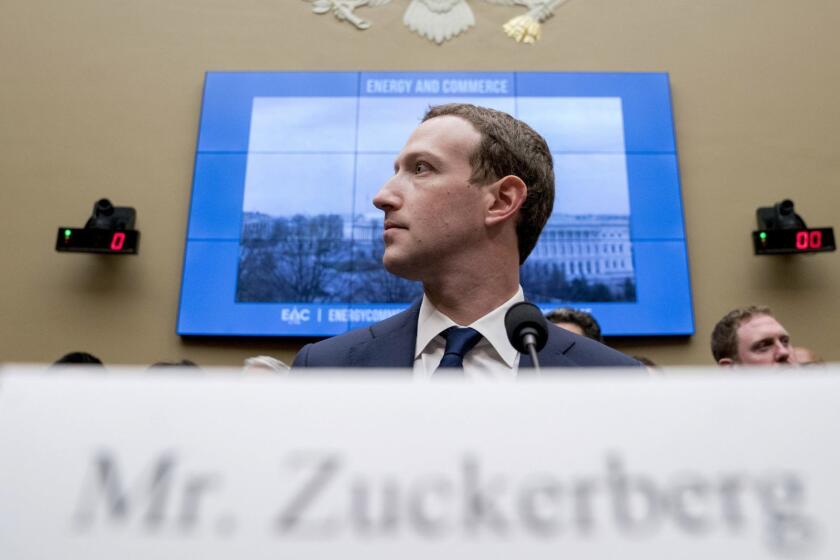Column: The FTC is pushing new rights for workers. Big business is pitching a fit, of course

Whenever a government agency proposes a regulation that might help workers by reining in an employer abuse, you can count on some heavy breathing from the big business lobby.
Case in point: The Federal Trade Commission’s move to ban noncompete clauses in employment contracts, which forbid ex-workers to take jobs in their chosen field, sometimes for years after they quit and often within hundreds of miles of their former employer. About 1 in 5 American workers — 30 million people — are bound by these restrictions.
The FTC’s target is a good one. “By preventing workers across the labor force from pursuing better opportunities that offer higher pay or better working conditions, and by preventing employers from hiring qualified workers bound by these contracts, noncompetes hurt workers and harm competition,” the commission wrote in issuing its rule proposal on Jan. 5.
The U.S. Chamber of Commerce provided the heavy breathing on Jan. 22, through an op-ed in the Wall Street Journal with the byline of the chamber’s president and chief executive, Suzanne P. Clark.
By preventing workers across the labor force from pursuing better opportunities that offer higher pay or better working conditions...noncompetes hurt workers and harm competition
— Federal Trade Commission
For Clark, the proposal was a sign that FTC Chair Lina Khan “doesn’t intend to let the law or Constitution get in her way” as she tries to level the playing field between employers and employees.
The chamber, she writes, will fight the noncompete clause rule “with all the tools at our disposal, including litigation.”
Get the latest from Michael Hiltzik
Commentary on economics and more from a Pulitzer Prize winner.
You may occasionally receive promotional content from the Los Angeles Times.
A couple of things about this. Clark puts her thumb on the scale by referring to the FTC’s target as noncompete “agreements.”
In most cases, they’re not agreements, in the sense of having resulted from negotiations between employer and employee. Rather, they’re restrictions imposed on workers by businesses, often hidden away in the fine print of employment contracts.
Workers often don’t even know they’re in place until after they’ve left one company for another, and their original employer threatens a lawsuit.
Also, it’s obvious that the chamber isn’t merely concerned about the noncompete clause regulation but about the Khan-led FTC’s intention to take a tougher stand against unfair methods of competition.
If the commission is allowed to ban noncompete clauses, “there is no aspect of employment or commercial arrangements that it doesn’t have the authority to regulate or ban arbitrarily,” Clark frets, sounding more than a teensy bit paranoid. “Don’t like the pay gap between executives and nonexecutives? The FTC could simply declare it unfair and regulate it.”
Facing a tough regulator for the first time, Facebook and Amazon are trying to sideline FTC Chair Lina Khan.
The chamber is targeting not these rules themselves but a new, more effective approach to regulation that the FTC unveiled in 2021 and of which the new proposal is an early example.
More on that in a moment. First, let’s take a closer look at noncompete clauses in general.
The popularity of these clauses appears to be waning at the state level. In three states they’re flatly unenforceable by law: California, North Dakota and Oklahoma.
In addition, 28 states ban them for certain occupations (often doctors and other healthcare workers), 11 states ban them for low- or middle-income workers (in Nevada, for workers earning less than $14.50 an hour) and nine ban those that restrict movement for extended periods (typically more than one year). Twelve states impose other restrictions on noncompetes. Many of these restrictions have been enacted within the last three years.
In issuing its proposal, the FTC is fulfilling a directive from President Biden. In a 2021 executive order on promoting competition in the U.S. economy, Biden instructed the FTC to take a hard look at noncompete clauses and any other workplace rules that “unfairly limit worker mobility.”
Big business doesn’t have much of a case in favor of noncompete clauses. They’re the antithesis of the principles supposedly honored by “right to work” antiunion laws so beloved by employers and conservative politicians. They do, however, have a well-marked capacity to suppress wages and lock workers in lousy jobs.
Noncompete clauses traditionally were justified as measures to protect a company’s trade secrets. Over time, they were expanded to absurd extents, covering menial and minimum-wage workers and so-called independent contractors who had no access to an employer’s confidential information.
The fast-food chain Jimmy John’s, for example, prohibited its employees from working at any other business that sells “submarine, hero-type, deli-style, pita, and/or wrapped or rolled sandwiches” within up to three miles from any Jimmy John’s store and for two years after leaving the company, according to a lawsuit filed in 2016 by Illinois Atty. Gen. Lisa Madigan. The franchisor agreed to drop the clause to settle Madigan’s lawsuit and a second lawsuit filed by New York state.
Millions of victims of the Equifax data breach have just learned their $125 settlement is a charade
That same year, New York Atty. Gen. Eric Schneiderman forced a medical lab firm to drop noncompete clauses that blocked workers from taking jobs with other firms for nine months after they left the company and within 50 miles of the firm’s locations. The clauses at issue applied to technicians who traveled to homes and offices to draw blood, collect urine samples and conduct routine physical exams such as taking blood pressure readings.
Academic studies cited by the FTC, the White House and the Treasury Department have found that as many as 38% of workers have labored under such a clause at some point in their working life. Only 1 in 10 workers negotiated over their noncompete restrictions, and about one-third were presented with the clause “after having already accepted their job offer,” researchers at the University of Michigan and the University of Maryland found.
On average, noncompete clauses reduce hourly wages by anywhere from 2% to 21%. A 2008 Oregon ban on noncompete clauses for hourly workers in Oregon, according to a study by Michael Lipsitz of the FTC and Evan Starr of the University of Maryland, “improved average occupational status in Oregon, raised job-to-job mobility, and increased the proportion of salaried workers without affecting hours worked.”
Noncompetes don’t only suppress wages and job mobility at the low end of the scale. They reduce the ability of higher-paid and -trained workers to start their own businesses.
The absence of noncompete enforcement may well have been an important factor in the development of Silicon Valley as a vibrant seedbed of innovation. In 1957, eight top-level employees of Shockley Semiconductor left the Palo Alto firm to found their own company, Fairchild Semiconductor. (Shockley, who was an inept and abusive boss, called them the “traitorous eight.”)
By 1968, all eight had moved on again, starting Intel Corp., among other ventures. One of the eight, Jean Hoerni, launched more than a dozen startups in subsequent years, as political scientist Annalee Saxenian of UC Berkeley observed in “Regional Advantage,” her seminal 1994 book about the evolution of Silicon Valley.
Had Shockley tried to confine the “traitorous eight” with noncompete agreements, the birth of Silicon Valley might have been much more difficult.
That brings us back to the FTC’s initiative. It’s part of an explicit change in how the commission approaches its regulatory duties. Until 2021, it took a case-by-case approach, bringing lawsuits or the threat of lawsuits against companies deemed to be engaging in anticompetitive behavior, and reaching out-of-court settlements in the majority of those cases.
The result was an “uninspiring, if not bleak” enforcement record over the commission’s more than 100 years of existence, as former Commissioner Joshua D. Wright and former FTC attorney Jan Rybnicek wrote in 2014.
“One hundred years is ample time ... to evaluate the virtues of the commission’s case-by-case approach,” they wrote. “The results of the experiment are in. They are not impressive.” The case law on unfair methods of competition has ended up being spotty and ad hoc, they asserted, in advocating for a system of policy statements defining unfair practices in advance.
The FTC absolves Zuckerberg and Sandberg of responsibility for Facebook’s privacy violations.
That’s the approach being undertaken by the FTC today. It’s unsurprising that it makes the Chamber of Commerce quail. In the past, businesses accused of misbehavior by the FTC could settle their cases with out-of-court settlements involving payments of chump change and leaving no trace of regulatory principles behind.
The chamber has one ally within the FTC, Commissioner Christine S. Wilson, a Trump appointee. Wilson dissented both from the commission’s 2021 vote to change its enforcement approach and from its decision to propose a ban on noncompete clauses.
Clark mentioned the former dissent approvingly in her Wall Street Journal op-ed, specifically Wilson’s assertion that the FTC majority was taking upon itself “the authority summarily to condemn essentially any business conduct it finds distasteful.”
(She sneeringly referred to the majority’s 2021 decision as “the work of an academic or think tank fellow who dreams of banning unpopular conduct and remaking the economy”; this was an obvious slap at Khan, a former faculty member at Columbia law school, a former FTC lawyer, and former legal director at the Open Markets Institute, which is, yes, a think tank.)
In her dissent from the noncompete initiative, Wilson stated that 47 state legislatures have “chosen to allow” noncomplete clauses. This is stretching the truth to the breaking point. Leaving aside the three states in which these clauses are banned outright, the truth is that a majority of states do restrict them in certain cases. In most of those that don’t, legislatures simply haven’t chosen to ban them, which is obviously different from making an affirmative choice to allow them.
Commissioner Wilson appeared to forget that in proposing a blanket rule against noncompete clauses, the commission was doing exactly what she had asked for in her previous dissent. After the commission scrapped its case-by-case approach, she groused that until it issued specific guidance, it “left businesses in the dark on how to structure their conduct to avoid a challenge by the commission.”
She added, “Due process demands that the lines between lawful and unlawful conduct be drawn clearly.”
Now she’s complaining that the proposed noncompete ban, which draws precisely such a line, allows the majority “summarily to condemn conduct it finds distasteful.”
In fact, the FTC isn’t acting so summarily: It has given the public 60 days to file comments and leaves open the possibility that it will make changes in the proposed rule based on those comments and its own further analysis.
In other words, the FTC is taking a measured approach. It compiled the evidence on noncompete clauses, drafted a proposed rule and put it out for public scrutiny. Well, yes. Isn’t that the role of a regulatory agency?
In any case, isn’t it the role of a regulatory agency to condemn conduct it finds distasteful? The alternative is to let things slide, which was the FTC’s old approach. Good riddance to that rubbish.
More to Read
Get the latest from Michael Hiltzik
Commentary on economics and more from a Pulitzer Prize winner.
You may occasionally receive promotional content from the Los Angeles Times.














